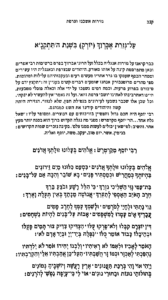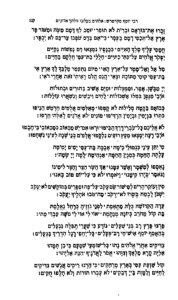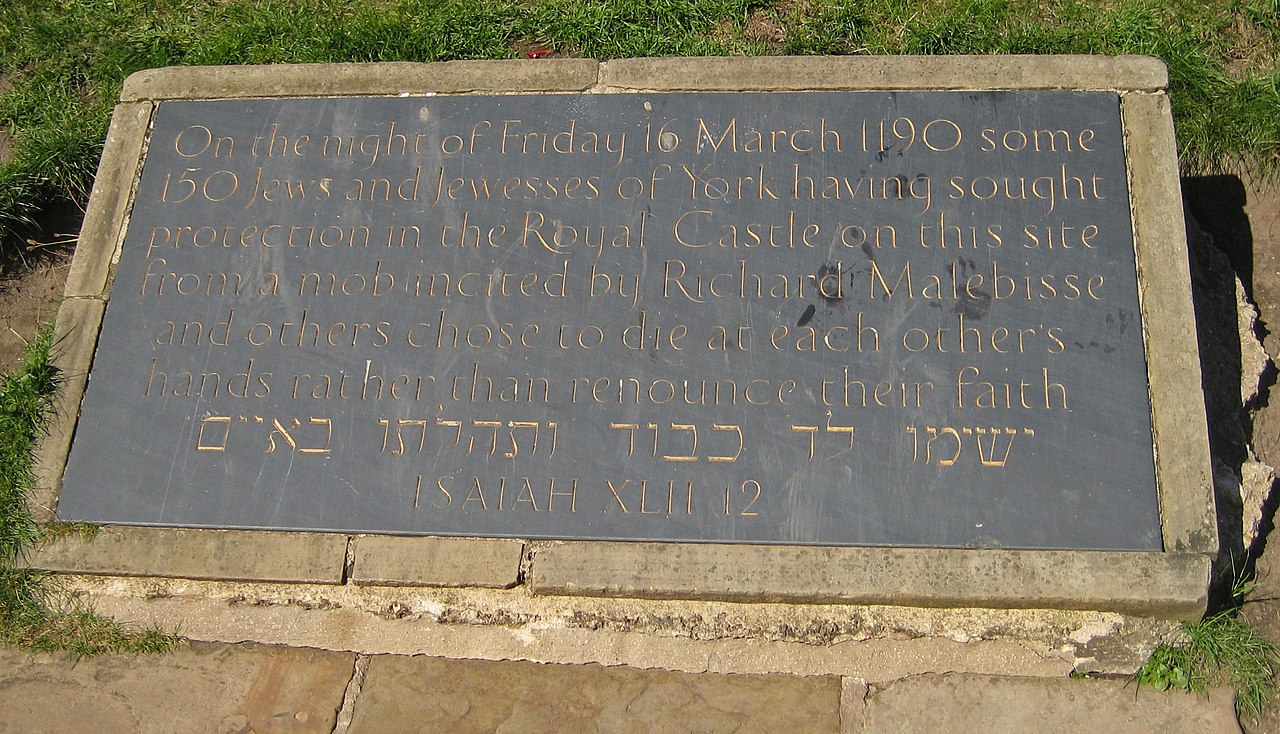Note: “The CAUSE” is used to translate the Divine Name YHVH, based on the philosophical idea of God as the Prime Mover and on the interpretation of the Name as a causative form of the copula – “causes to be.”
| Source (Hebrew) | Translation (English) |
|---|---|
|
עַל־גְּזֵרַת אֶבְּרוֹךְ בִּשְׁנַת התַּתְקְנָא
רַבִּי יוֹסֵף מִקַּרְטְרֶשׂ׃ |
Upon the Decrees of Ebrauc[1] The medieval French name for York. in the Year 4951
R. Yosef of Chartres |
|
אֱלֹהִים בְּעָלֽוּנוּ זוּלָתְךָ אֲדֹנִים (ישעיהו כו:יג)
כִּמְעַט כִּלּֽוּנוּ מַֽיִם זֵידוֹנִים בִּהְיוֹתְךָ כְּמַחֲרִישׁ וּכְמַסְתֵּר פָּנִים (ישעיהו נג:ג) בָּא שׁוֹבֵר וְהִכָּה אֵם עַל־בָּנִים׃ |
God, rulers other than You possessed us.
The arrogant waters almost finished us off. To us You were silent and hiding face; the shatterer came and struck down mother with children. |
|
בַּת־עַמִּי גָּזִּי הַשְׁלִיכִי נִזְרֵךְ (ירמיהו ז:כט)
כִּי הִלֵּל רָשָׁע וּבֹצֵֽעַ בֵּרֵךְ (תהילים י:ג) חֶֽרֶב הָאֹיֵב הֵאָסְפִי לְתַעְרֵךְ (ירמיהו מז:ו) אֲנוּשָׁה מַכָּתֵךְ (מיכה א:ט) בְּאֵין תְּעָלָה וְאֶֽרֶךְ׃ |
My dear people, shear and cast away your locks;
for the wicked boasts and the robber brags. Withdraw, enemy’s sword, to your sheath! For your wound is grevious, without healing or recovery. |
|
גֵּוִי נָתַֽתִּי וּלְחָיַי לְמֹרְטִים (ישעיהו נ:ו)
וּלְשִׁמְךָ עַמְּךָ לַחֶֽרֶב מָטִים עֲבָדֶֽיךָ אָיֹם עָמְדוּ לַמִּשְׁפָּטִים אָבוֹת עַל־בָּנִים לִהְיוֹת נִשְׁחָטִים׃ |
I offered my back and checks to the scourers,
and for Your name Your people is spread to the sword, Your servants, Awesome One, stood to judgement fathers and children to be slaughtered. |
|
דִּין יוֹצְרָם קִבְּלוּ וְלֹא פָרְקוּ עֻלּוֹ
הִצְדִּיקוּ צַדִּיק צוּר תָּמִים פָּעֳלוֹ (דברים לב:ד) וּבְהֵיכָלוֹ כָּבוֹד אוֹמֵר כֻּלּוֹ (תהילים כט:ט) נִפְּלָה בְּיַד יְהֹוָה וּבְיַד אָדָם לֹא׃ |
They accepted their Maker’s judgement, not breaking their yoke.
They judged righteous the Rock of pure deeds, In whose Palace “glory!” everyone states. Let us fall by the hand of the CAUSE, not human hand! |
|
הָאֹמֵר לְאָבִיו וּלְאִמּוֹ לֹא רְאִיתִיו (דברים לג:ט)
וְלִבְנוֹ יְחִידוֹ אֹמֵר לֹא יְלָדְתִיו נֶהְפַּֽכְתִּי לְאַכְזָר וּכְמוֹ זָר חֲשַׁבְתִּיו (הושע ח:יב) הַעַל־כֵּן אֲהַבְתִּיו אֵלַי וְהִקְרַבְתִּיו׃ |
Saying to his parents “I do not know them,”
to his only son “I did not bear them,” I am turned cruel, considered as alien, is this why I loved him and brought him close to me? |
|
וַיְהִי אוֹי וָהִי בְּרַכַּת תַּעֲנוּגִים
אֶֽרֶץ רָעֲשָׁה וְיוֹשְׁבֶֽיהָ נְמוֹגִים בְּתוּלוֹתַי נוּגוֹת וּבַחוּרַי (איכה א:ד; ב:כא) נוּגִים אוֹי לִי כִּי עָיְפָה נַפְשִׁי לְהֹרְגִים׃ (ירמיהו ד:לא) |
And it was — woe, and thus to the tender sweet one!
Earth shook and its residents were flabbergasted. My lasses and lads moan: Woe is me, for my soul is tired of murder! |
|
זָכְרוּ אֶת־בּוֹרְאָם וּבְרִית לֹא תוּפַר
יוּטַב לְךָ דָּמָם מִשֶּׂה וּמִשּׁוֹר פָּר אֶֽרֶץ אַל־תְּכַסִּי דָמָם (איוב טז:יח) בֶּעָפָר כִּי־אִם בְּדַם שֹׁפְכו עַד־כֵּס לֹא יְכֻפָּר׃ (במדבר לה:לג) |
Recalling their Creator, they did not breach the covenant.
May their blood be better to You than sheep or young oxen! Earth, do not cover their blood in dust. For till covered, only the spillers’ own blood can atone it. |
|
חֲמָסִי עָלֶיךָ מֶֽלֶךְ הָאִיִּים
בִּכְנָפָיו נִמְצְאוּ דַּם נַפְשׁוֹת נְקִיִּים (ירמיהו ב:לד) יִפְקֹד אֱלֹהִים עַל־כִּתֵּי כְתִּיִּים חַלֲלֵי בַת־עַמִּי (ירמיהו ח:כג) חֶלְקָם בַּחַיִּים׃ (תהילים יז:יד) |
My violence is on you, king of the isles,[2] Meaning the King of England, in 1190 referring to Richard Ⅰ Lionheart. His announcement that he would leave on the Crusades inflamed antisemitism around the nation.
on whose garments is found innocent blood. May God recall the groups of Kittites![3] The Kittites are a foreign island nation mentioned in the Bible. Originally referring to the Cypriots who lived in Citium, here R. Yosef is using it to refer to gentile islanders in general and the English in specific. May the slain of my dear people be apportioned life. |
|
טַל אַל ואַל־מָטָר (שמואל ב׳ א:כא) עַל־אֶֽרֶץ הָאִי
מִיּוֹם נִתְעַטַּר מַלְכֵּךְ לָךְ אֶֽרֶץ אִי בַּת־עַמִּי קוּמִי מִתּוֹכָהּ וּצְאִי הֲגַם הֲלֹם רָאִיתִי זֹאת אַחֲרֵי רֹאִי׃ (בראשית טז:יג) |
Dew, fall not, nor rain on the land of the isle,[4] England.
from the day your king was crowned for you, woe, island! My poor people, get up from there and flee. Have I not gone on seeing after I was seen? |
|
יְהֹוָה מִבָּשָׁן אָמַר וּמִמְּצֻלוֹת
וּמִיָּם אָשִׁיב (תהילים סח:כג) בַּחוּרִים וּבְתוּלוֹת אֹיְבַי מִגֶּֽפֶן בִּטְּלוּ אַשְׁכּוֹלוֹת לַחִים וִיבֵשִׁים (במדבר ו:ג) וְנִשְׁאֲרוּ עוֹלֵלוֹת׃ (עובדיה א:ה) |
The CAUSE said, from Bashan and from the depths
and from the sea I will retrieve my lads and lasses. My enemies have despoiled the clusters from the vine; ripe grapes and raisins, leaving only gleanings. |
|
כְּבוֹאָם בַּקָמָה מְלִילוֹת לֹא קָטְפוּ (דברים כג:כו)
מְאַלְּמִים אֲלֻמִּים (בראשית לז:ז) חֶרְמֵשׁ הֵנִיפוּ כִּתְּרוּ בִּנְיָמִין וּבְיָמִין הִרְדִּיפוּ (שופטים כ:מג) מוֹנִים לֹא אֲדֹנִים לָאֵֽלֶּה (מלכים א׳ כב:יז) חֵרְפוּ׃ |
When coming in the grain they did not pluck ears;
they bound bundles and swung a sickle. They encircled Benjamin[5] Possibly the name of a martyr. Alternatively, and perhaps more likely, a metaphorical reference to Israel as a whole. and pursued right-handed, saying “they have no leader,” they abused. |
|
לוֹא אֲלֵיכֶם כׇּל־עֹבְרֵי דֶֽרֶךְ הַבִּיטוּ
וּרְאוּ אִם־יֵשׁ מַכְאוֹב כְּמַכְאוֹבִי (איכה א:יב) בִּי חָבָטוּ אֹיְבַי רָעָה יִמְצְאוּ מֵעֵץ רוֹעִים נִלְקָטוּ אֲלָפִים בְּנֵי שָׁנָה לְעֵינַי נִשְׁחָטוּ׃ |
Not upon you, all who pass on the road; look
and see if there is pain like my pain! They beat me; My enemies found evil, a shepherds’ mob gathered, year-old cattle slaughtered before my eyes! |
|
מִי יִתֵּן עֵינַי כִּנְטוּלֵי כִימָה (תלמוד בבלי, ברכות נט)
אֶבְכֶּה בַּת־עַמִּי יָמִים יְמִימָה עָלְתָה הַחֵמָה כְּמִנְיַן הַחַמָּה אַנְהִימָה לָמָה יְהֹוָה שָׁמָהּ׃ |
Who can make my eyes like the Pleiades-flooders?[6] Berakhot 59a says, “When the Holy Blesseed One sought to bring a flood into the world, God took two stars from Pleiades and brought the flood upon the world.”
I would cry for my dear people day after day. Rage increased like the solar count, let me roar, why did the CAUSE do this!? |
|
נֶאֶסְפוּ לְמִשְׁמָר וְאָשֵׁר עִמָּנוּ
אַךְ הַשָּׂר הֵצֵר וְהַצָּר לִימִנוֹ וַנֹּאמַר בְּיָדוֹ קִימָנוּ וַיֹּאמְרוּ לֹא כִּי עַל־יוֹם טוֹב בָּאנוּ׃ (שמואל א׳ כה:ח) |
Gathered to the castle,[7] Clifford’s Tower and Asher[8] According to the vocalization, a name of a martyr. This could also be a misvocalization of the relative clause, leading to “and those with them” with them,
but the constable oppressed them with the foe standing by. And we said, “Take our property!” but they said, “No, we came for a feast-day.[9] A pun on the name of Rabbi Yom Tov of Joigny, the author of the piyyut Omnam Ken and the person who, according to the medieval chronicles, suggest the community of York commit mass suicide rather than be baptized. ” |
|
סִין וְעוֹקֵר הָרִים לְמִישׁוֹר שָׁם עָקֹב
עַל־פֶּה וּסְפָרִים בְּמוֹקְשִׁים לֹא יִנְקֹב (איוב מ:כד) יִשְׁכֹּן לָבֶֽטַח בְּשָׂרוֹ (תהילים טז:ט) לֹא־יִרְקֹב מַה־טֹּבוּ אֹהָלֶֽיךָ יַעֲקֹב׃ (במדבר כד:ה) |
Sinai, uprooting mountains and straightening the bent,
by words and text unpierceable by hooks. May his flesh rest in peace, unrotting. How lovely are Your tents, Jacob![10] Possibly the name of a martyr — identified by Leopold Zunz with a local moneylender named Jurnet. Alternatively, and perhaps more likely, a metaphorical reference to Israel as a whole. |
|
עֵדָה הַקְּדוֹשָׁה כֻּלָהּ מַתְאֶֽמֶת
לִפְנֵי גוֹזְזֶֽיהָ כְּרָחֵל נֶאֱלֶֽמֶת (ישעיהו נג:ז) בַּת קוֹל מֵחֹרֵב כְּיוֹנָה מנַהֶֽמֶת אוֹי לִי אוֹי לִי מֹשֶׁה עַבְדִּי מֵת! (יהשוע א:ב) |
The whole holy community matched him;
like a lamb before its shearers they stood dumb. A voice from Horev like a dove moaned: Woe is me, woe is me! Moses[11] A martyr. Identified by Cecil Roth with Moshe ben Sarah, a name found in tax documents of the time. My servant died! |
|
פָּרְצוּ פֶּֽרֶץ רָב בְּנֵי שֻׁעָלִים
נֹדַע כִּי שַׁעֲרֵי תְפִלָּה נִנְעָלִים בְּהֵאָסֵף יוֹסֵף אִישׁ־חַי רַב־פְּעָלִים (שמואל ב׳ כג:כ) כׇּל־יְחֵפֵי רָֽגֶל הִדְרִיךְ בַּנְּעָלִים׃ (ישעיהו יא:טו) |
The young foxes breached a great breach;
we knew that the gates of prayer were closed, When Joseph[12] A martyr. Josce of York, leader of the community of Jews of York. the living man, great in deeds, was gathered, who would send all barefoot ones shod. |
|
צָדִּיקִים אַחֲרֵי אֱלֹהִים נָֽהוּ
כׇּל־שׁוֹמְעֵי שִׁמְעָם כִּי כֵן תָּמָהוּ אֵלִיָּה קָרָא מַלְאָךְ וְצִוָּֽהוּ אֱמֹר לַאֲדֹנֶֽיךָ הִנֵּה אֵלִיָּֽהוּ׃ (מלכים א׳ יח:ח) |
The righteous cried after God.
All who heard the news were thus astonished. “Elijah![13] A martyr. Specifically, R. Elijah “the Holy” of York, cited on multiple occasions in the Tosafot (for instance, Tosafot on Yoma 27a:8, Tosafot on Zevachim 14b:10) ” called the angel, and commanded him: “Tell your master, here is Elijah!” |
|
קוֹל שַׁוְעַת עַמִּי בְּאֶֽרֶץ מַרְחַקִּים (ירמיהו ח:יט)
כִּי הָרְגוּ רֵיקִים אֲנָשִׁים צַדִּיקִים לַחַיִּים וְלַמָּוֶת בַּיהֹוָה דְּבֵקִים לֹא עָבְרוּ תוֹרוֹת וְלֹא חָלְפוּ חֻקִּים׃ (ישעיהו כד:ה) |
The sound of my people’s cry was heard afar,
for empty ones killed righteous people. In life and in death they clung to the CAUSE, never transgressing the Teachings nor changing the Laws. |
|
רִאשׁוֹנָה בְּפוֹשְׁרִים וּשְׁנִיָּה בְּרוֹתְחִים
בִּהְיוֹת כָּאֲלָפִים הָאַלּוּפִים זְבוּחִים שְׁעָרַי שׁוֹמֵמִים כֹּהֲנַי נֶאֱנָחִים (איכה א:ד) כִּי הִגְעִיל שָׂרֵי בַת־עַמִּי בְּרוֹתְחִים׃ |
First warm water, then boiling,
as leaders like cattle were sacrificed. My gates desolate, my priests moan, for the princes of my people were disinfected with boiling! |
|
שָֽׁמָּה קִדְּשֽׁוּךָ שׁוֹמְרֵי מִשְׁמָרוֹת
לָשֵׂאת אֵימֶֽךָ לְרֹאשׁ אַשְׁמֻרוֹת (איכה ב:יט) מְתֵי שֵׁם שָׂרֵי חֲמִשִּׁים וַעֲשָׂרוֹת (שמות יח:כא-כה; דברים א:טו) וּבַעֲיָרוֹת אֲחֵרוֹת לֹא אֵדַע סְפוֹרוֹת׃ |
There the watchmen sanctified You,
to keep Your reverence to the morning watch. The dead there, chieftans of fifties and tens, and in other cities I cannot recount. |
|
תַּֽחַת מִקְנֵיהֶם הִקְרִיבוּ בְנֵיהֶם
וְרֵאשִׁית אוֹנֵיהֶם שָׁחֲטוּ לְעֵינֵיהֶם קְדוֹשִׁים לֹא־חָשְׂכוּ מִמְּךָ יְחִידֵיהֶם כִּי אָחֲזוּ מַעֲשֶׂה אֲבוֹתֵיהֶם בִּידֵיהֶם׃ |
In place of their herds they offered ther children,
and the firstlings of their passion slaughtered before their eyes. Holy ones did not withhold their only ones from You, for they held their ancestors’ act in their hands. |
|
יֹשְׁבֵי אֹהָלִים נְטוּעִים כַּאֲהָלִים
שׁוֹקְלֵי מִשְׁקָלִים בְּאַוִּיר מִגְדַּלִים בְּהֵאָסֵף חֲכָמַי וּסְפָרַי נִגְלָלִים אוֹתִיּוֹת פּוֹרְחוֹת וְנִשְׂרְפוּ גְוִילִים׃ (תלמוד בבלי, עבודה זרה יח) |
Those dwelling in tents, planted like aloes,
weighing weights, towers in the atmosphere, When my sages were gathered, my scrolls rolled up, letters flew up, though the parchment burned. |
|
וּמַה־יָּקְרוּ רֵעִים וּמֶה־עָצמוּ רָאשִׁים
וְלֹא נִכְּרוּ שׁוֹעִים שָֽׁמָּה מֵרָשִׁים חַכְמֵי חֲרָשִׁים וּנְבוֹנֵי לְחָשִׁים נֶֽצַח יִשְׂרָאֵל רֶֽכֶב וּפָרָשׁים׃ |
And how honored these comrades, how mighty the chiefs!
But they did not distinguish the poor there from the rich. Wise in skill, and experts in speech, Israel’s victory, chariots and riders! |
|
שִׂיחָתָם טְהוֹרָה מְזֻקֶּֽקֶת בַּעֲלִיל
אֲרֻכָּה וּקְצָרָה מִיהוּדָה וְגָלִיל פֶּה קָדוֹש הוֹרָה כׇּל־עֻבָּר וּשְׁלִיל יָשִֽׂימוּ קְטֹרָה בְאַפֶּֽךָ וְכָלִיל׃ (דברים לג:י) |
Their discourse was pure, as clarified as the heights;
long and short, from Judea or Galil. Holy mouths taught about intercalation and embryos — like incense and whoile-offering it rose to Your Nostrils. |
|
פְּקָדֽוּךָ בַּצַּר מוּסָרְךָ לָֽמוֹ (ישעיהו כו:טז)
אִישׁ הוֹצִיא רוּחוֹ וְהִמְצִיא דָמוֹ יֶעֱרַב לְמֶֽלֶךְ רַב כְּקׇרְבְּנוֹתָיו מֵאוּלַמּוֹ אַף יְכַפֵּר אַדְמָתוֹ עַמּוֹ׃ (דברים לב:מג) |
They remembered You in their stress, Your chastisement upon them,
each gave their life and let forth their blood. May this be like temple-offerings to the great Sovereign, but atone the land for its people! |
|
רָפוּ יָדַֽיִּם לִשְׁמֹֽעַ צַעֲקָתָם
נוֹדַע כִּי פֶֽלַח רִמּוֹן רַקָּתָם (שיר השירים ד:ג) תָּנֽוּחַ בִּצְרוֹר חַיִּים אַבְקָתָם זֹאת נַחֲלַת עַבְדֵי יְהֹוָה וְצִדְקָתָם׃ (ישעיהו נד:יז) |
Our hands went slack to hear the cry,
we knew that their brows were ruddy as a split pomegranate. May their dust rest in the bonds of life. This is the inheritance of the CAUSE’s servants and their righteousness! |
Two sources were used in the preparation of the text presented here. First, from the appendix to Cecil Roth’s “A Hebrew Elegy for the Martyrs of 1190” in Transactions (Jewish Historical Society of England) Vol. 16 (1945-1951), pp. 213-220. Second, the vocalized text from Abraham Meir Habermann’s Decrees of Ashkenaz and France (referenced in the aforementioned article by Cecil Roth). English translation by Isaac Gantwerk Mayer.
Source(s)
Notes
| 1 | The medieval French name for York. |
|---|---|
| 2 | Meaning the King of England, in 1190 referring to Richard Ⅰ Lionheart. His announcement that he would leave on the Crusades inflamed antisemitism around the nation. |
| 3 | The Kittites are a foreign island nation mentioned in the Bible. Originally referring to the Cypriots who lived in Citium, here R. Yosef is using it to refer to gentile islanders in general and the English in specific. |
| 4 | England. |
| 5 | Possibly the name of a martyr. Alternatively, and perhaps more likely, a metaphorical reference to Israel as a whole. |
| 6 | Berakhot 59a says, “When the Holy Blesseed One sought to bring a flood into the world, God took two stars from Pleiades and brought the flood upon the world.” |
| 7 | Clifford’s Tower |
| 8 | According to the vocalization, a name of a martyr. This could also be a misvocalization of the relative clause, leading to “and those with them” |
| 9 | A pun on the name of Rabbi Yom Tov of Joigny, the author of the piyyut Omnam Ken and the person who, according to the medieval chronicles, suggest the community of York commit mass suicide rather than be baptized. |
| 10 | Possibly the name of a martyr — identified by Leopold Zunz with a local moneylender named Jurnet. Alternatively, and perhaps more likely, a metaphorical reference to Israel as a whole. |
| 11 | A martyr. Identified by Cecil Roth with Moshe ben Sarah, a name found in tax documents of the time. |
| 12 | A martyr. Josce of York, leader of the community of Jews of York. |
| 13 | A martyr. Specifically, R. Elijah “the Holy” of York, cited on multiple occasions in the Tosafot (for instance, Tosafot on Yoma 27a:8, Tosafot on Zevachim 14b:10) |





